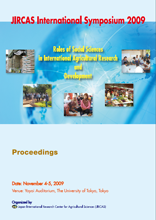Roles of Social Sciences in International Agricultural Research and Development

Date: November 4 – 5, 2009
Venue: Yayoi Auditorium, University of Tokyo
Both the high food prices which occurred in 2007-2008 and the worldwide economic recession afterwards have seriously affected the economies of developing regions. It is reported that the reduction of the undernourished population, a Millennium Development Goal, has indeed become more difficult to achieve.
The G8 Summit held this year at L’Aquila, Italy which follows the one at Toyako, Hokkaido, Japan last year repeatedly expressed high expectations toward agricultural research and technology development for achieving world food security. Many research issues which need to be tackled in combination with policy and institutional studies have piled up. Those include increase in agricultural investment, dissemination of appropriate technologies, mitigation and adaptation of climate change and so on. Furthermore, the Consultative Group of International Agricultural Research (CGIAR) emphasizes the importance of policy and institutional studies, listing ‘Policies for people’ as one of the three major strategic objectives in the course of its Change Management initiative.
Social Sciences dealing with agriculture have so far generated plenty of research results, making great contributions to the formulation of agricultural policies in the world and to the methodological improvement of rural development, etc. However, they still have to play a central role in providing effective answers to the challenges of a global scale which we are currently facing. This symposium aims to identify the problems and indicate research directions in Social Sciences which are related to agriculture such as agricultural economics, rural sociology, etc., through the exchange of views among domestic and foreign experts and researchers in this field.
Program
Opening Remarks
- Kenji Iiyama (JIRCAS)
- Shin-ichi Shogenji (The Univ. of Tokyo)
Keynote Lectures
Chair: Osamu Koyama (JIRCAS)
- The World Four Crises : Implications for the Food Security of Developing Countries
Maximo Torero (IFPRI) - Poverty Reduction, Rural Markets and Human Capital
Takashi Kurosaki (Hitotsubashi Univ.) - General Explanation on the Three Sessions
Masuo Ando (JIRCAS)
Session 1: Impacts of Globalized Economy and Climate Change
Chair: Jun Furuya (JIRCAS)
- Globalized World Economy and Agriculture in Developing Countries
William H. Meyers (Univ. of Missouri) - Multifunctionality of Agriculture: The Role of Social Science in Identifying the Best Policy
Mikitaro Shobayashi (Gakushuin Women’s College) - Climate Change and Food Security in Developing Countries and Role of Social Sciences
Jun Furuya (JIRCAS)
Session 2: Participatory Research and Development
Chair: Ryuichi Yamada (JIRCAS)
- Participatory Approach toward Agricultural and Rural Development
Masami Mizuno (Nihon Univ.) - Participatory Technology Research: Issues and Future Directions Drawn from Two Examples in Northeast Thailand and Central Mali
John S. Caldwell (JIRCAS) - Can Agricultural Research Be More Effective for the Rural Poor of Asia
Werner Stür and Rod Lefroy (CIAT) - Session Conclusion
Session 3: Impact Assessment of Agricultural Technology
Chair: Shigeki Yokoyama (JIRCAS)
- Impact Assessment of Rice Research: Issues and Challenges
Sushil Pandey (IRRI) - Learning Sustainability of Agricultural and Rural Development from a Project in Indonesia: From the Point of View of Impact Assessment
Yoshihiko Nishimura (Univ. of Ryukyus) - Social Challenges in Technical Decision-Making: Lessons from Social Controversies Concerning GM Crops
Tomiko Yamaguchi (International Christian Univ.) - Session Conclusion
General Discussion
- Chairs: Masuo Ando and Osamu Koyama (JIRCAS)
Closing Remarks
- Masami Yasunaka (Vice President of JIRCAS)
Career Profiles
Symposium Pictures
| Date of issued | |
|---|---|
| Creator | Japan International Research Center for Agricultural Sciences |
| Publisher | Japan International Research Center for Agricultural Sciences |
| Available Online | |
| NII resource type vocabulary | Conference Paper |
| Volume | 2009 |
| Language | eng |
